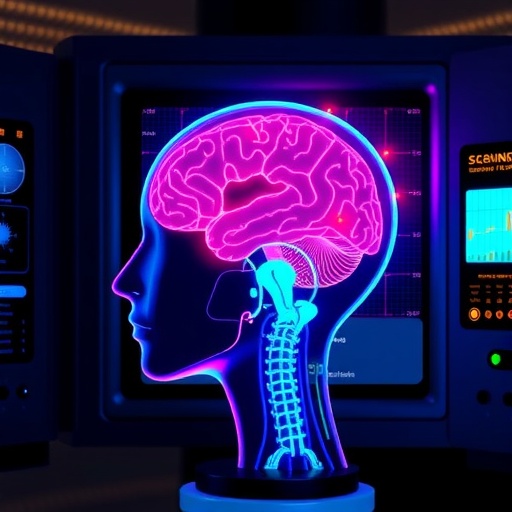In a groundbreaking advancement at the intersection of biomedical engineering and artificial intelligence, researchers have unveiled a machine learning-driven microwave system designed for noninvasive monitoring of intracranial pressure (ICP). This innovative method stands to revolutionize how clinicians assess and manage ICP, a critical factor influencing brain health and function. Elevated intracranial pressure can have devastating neurological consequences, including stroke, brain herniation, and death, underscoring the imperative for reliable and safe monitoring techniques.
Intracranial pressure refers to the pressure within the skull, which is regulated by the delicate balance of brain tissue volume, cerebrospinal fluid (CSF), and cerebral blood flow. Traditionally, ICP measurement has required invasive approaches, such as intraventricular catheter placement, which, while accurate, involve risks of infection, hemorrhage, and other complications. The quest for noninvasive, precise, and continuous monitoring methods has been a persistent challenge in clinical neuroscience. This latest development employs a remarkable synergy between microwave sensing technology and advanced machine learning algorithms to address this need.
At the heart of this novel system lies a quantitative microwave approach that leverages the distinct electromagnetic properties of biological tissues. Microwave sensors emit low-power signals that interact with the intracranial environment, and the reflected signals carry embedded information about pressure-induced changes in tissue and fluid composition. Significantly, the system is designed to be sensor-agnostic, meaning it can operate effectively with various types of microwave sensors without loss of measurement accuracy, offering flexibility for clinical and wearable device integration.
The research team applied a sophisticated two-tiered feature extraction process to the microwave signals, enabling the capture of subtle signal attributes that correspond to fluctuations in ICP. This dual-level extraction enhances the resolution and reliability of pressure estimations, surpassing previous microwave-based monitoring attempts that often struggled with signal noise and specificity. By focusing on finely tuned signal characteristics, the approach harnesses the full informational content of the microwave reflections.
To optimize sensor performance, six miniature, lightweight microwave sensors were tested in different spatial configurations. Sensor placement plays a crucial role in signal quality and ICP estimation fidelity, and the researchers meticulously evaluated various positioning strategies to identify arrangements that maximize sensitivity while maintaining wearer comfort. The small form factor and lightweight design also pave the way for future wearable implementations, enabling prolonged, continuous ICP monitoring in ambulatory patients.
A critical component of this study was the creation of a realistic human head phantom—a model constructed to emulate the dielectric properties and hydrodynamics of actual brain tissue and fluids. This phantom serves as an essential testbed to validate the system’s accuracy in controlled conditions before moving toward clinical trials. It replicates the complex interaction between microwave signals and the intracranial environment, allowing rigorous assessment of the system’s responsiveness to minute pressure changes.
Real-time operation, a key requirement for clinical usability, was achieved through an innovative data set creation module combined with an Ordered Selection Scheme (OSS). OSS intelligently filters signal attributes, selecting the most informative features to feed into a lightweight machine learning algorithm capable of rapid processing. The reduced computational overhead does not compromise precision, ensuring the system responds swiftly enough for continuous patient monitoring scenarios.
The machine learning model was trained using weighted regression techniques based on the features selected by OSS. This approach allows the system to quantitatively estimate ICP with remarkable accuracy by correlating specific signal patterns to known pressure values obtained from invasive reference devices. The system’s performance in detecting incremental changes confirms its potential for early warning applications, an invaluable asset in managing conditions such as traumatic brain injury and hydrocephalus.
Throughout extensive trials, the microwave system demonstrated sensitivity comparable to gold-standard invasive sensors, reliably detecting minute spikes and drops in intracranial pressure. This level of precision, combined with the noninvasive nature of the method, could drastically reduce the risks associated with current ICP monitoring technologies and streamline patient management in intensive care units and emergency settings.
One of the most compelling implications of this research is the potential for wearable ICP monitoring devices. Such devices would afford clinicians continuous, bedside-free access to critical pressure data, enabling timely intervention without the need for surgical implantation of sensors. This advance aligns with the broader healthcare trend toward personalized, remote, and minimally invasive diagnostics.
The integration of microwave sensing with machine learning also exemplifies the growing role of artificial intelligence in transforming medical diagnostics. By extracting nuanced patterns from complex physiological signals, machine learning algorithms can reveal insights that elude traditional signal processing methods, enhancing diagnostic accuracy and unlocking new possibilities for patient care.
While the results presented are promising, further studies including clinical trials will be necessary to confirm efficacy and safety in diverse patient populations. Nonetheless, this pioneering work sets a strong foundation for the future development of accessible, noninvasive ICP monitoring tools that could significantly improve neurological outcomes and patient quality of life.
In summary, the research by Singh, Särestöniemi, and Myllylä establishes a novel paradigm for ICP monitoring, combining the precision of microwave technology with the adaptive power of machine learning. Their system promises a shift away from invasive modalities toward a safer, more patient-friendly landscape for managing one of neurology’s most critical parameters.
Subject of Research: Intracranial pressure monitoring using a machine learning-enhanced microwave system
Article Title: Machine learning-driven microwave system for noninvasive monitoring of intracranial pressure
Article References: Singh, D., Särestöniemi, M. & Myllylä, T. Machine learning-driven microwave system for noninvasive monitoring of intracranial pressure. BioMed Eng OnLine 24, 118 (2025). https://doi.org/10.1186/s12938-025-01453-x
Image Credits: AI Generated
DOI: https://doi.org/10.1186/s12938-025-01453-x
Tags: advancements in clinical neuroscienceAI-driven microwave technologycerebral health managementcontinuous ICP measurement solutionselectromagnetic properties of biological tissuesinnovative medical sensing techniquesmachine learning in biomedical engineeringmicrowave sensing for brain healthnoninvasive intracranial pressure monitoringreducing risks in brain pressure assessmentsafe monitoring of intracranial pressuretracking brain pressure with microwaves





